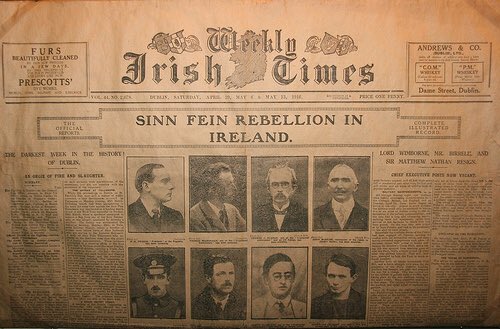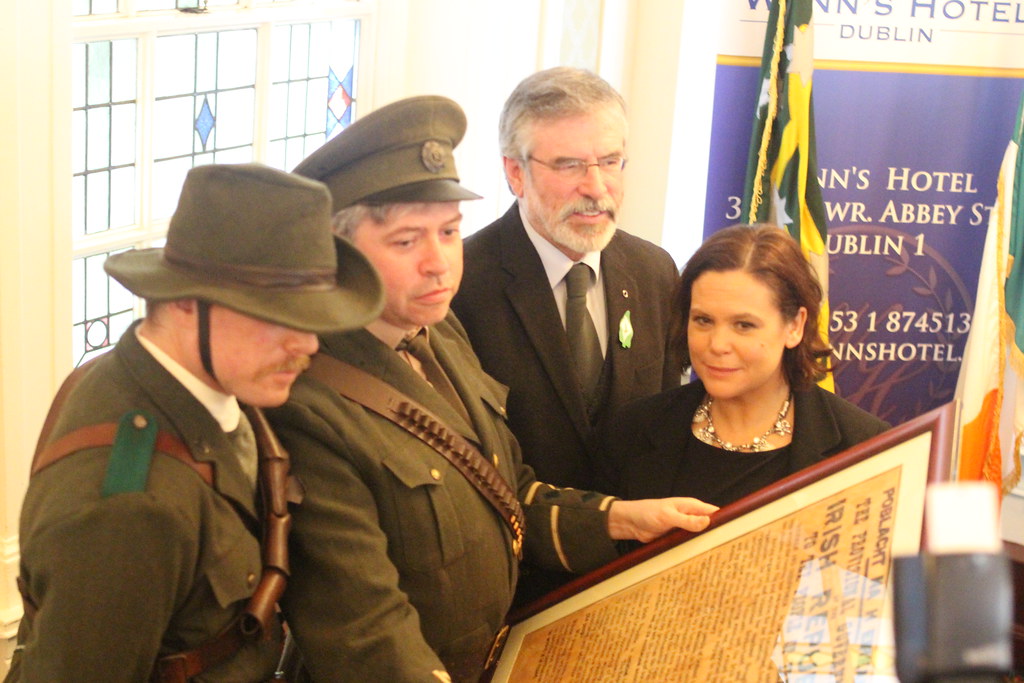

Take a look at the above front pages. On the left is the original Irish Times cover from April 1916, reporting on the Rising in Dublin. On the right is today’s Irish Times special edition reprint. Can you spot the difference?
It’s this: in today’s reprint, the heading ‘Sinn Féin Rebellion in Ireland’ has been removed.
This has caused something of a Twitter-storm (look it up: it’s similar to a storm in a tea cup).

In the red corner, people are alleging that the Irish Times is censoring its former self for political reasons: the newspaper has a traditionally critical line on today’s Sinn Féin party (Adams, McGuinness et al) and many have seen in this an attempt to stop today’s Sinn Féin capitalising politically by further claiming ownership of this founding moment of the Irish state.
In the blue corner, the paper’s defence is that this is simply a matter of space. It is a reprint, not an exact replica of the historical source, and therefore it is not a carbon copy.
I can see both sides of this argument here. If you look at the original, there is also a fairly prominent advertisements for ‘FURS’ (top left) – now you wouldn’t expect the paper to reproduce that, would you? (Actually, let’s leave furs out of this entirely because that is another kettle of fish entirely and I don’t want to start a twitter-storm involving PETA).


On the other hand, you have only to look to the uneasy political situation in the Republic of Ireland to see why the Irish Times might be determined to expunge any mention of Sinn Féin, even historically. While we are still without a government, the Irish Times – which prides itself on its liberal image – is loathe to hand any gains to a party which many on its staff regard as green fascists.
Add to this the fact that Sinn Féin have been fairly shamelessly going about ‘owning’ 1916, the same way they ‘own’ the 1981 Hunger Strikes, and you can see a clear motive for wanting to remove ‘Sinn Féin Rebellion’ from the headline in today’s edition. If I have to view another nauseating picture of the Sinn Féin party elite posing next to rebel re-enactors in Boer-inspired slouch hats and Sam Brown belts I may actually gag. If you haven’t had enough, there are plenty more to view here.

Trying to sanitise the 1916 Rising, however (or de-SinnFéinise it) is a dangerous game.
The writer Colm Toibín, interviewed last night on Channel 4 News, made a good point about why the Irish state must commemorate this event. To do otherwise, he argued, would hand the initiative to dissident republicans up north determined to take out prison officers or police as a commemorative souvenir, and he raised the spectre of balaclava-clad young men marching past Dublin’s GPO in place of the Irish Army.
That is fair enough. While the fiftieth anniversary (1966) commemoration is now viewed as a tad triumphalist, the Irish state has, this time, tried to strike a balance this time. But only – it should be remembered – after the public and media commentators baulked at the watered down, corporate crap originally offered up along with ill-conceived plans to invite a British royal along for the day.
In fact, the bien pensants in charge of things as Ireland hits its ‘decade of commemorations’ seem determined to push the ‘look how far we’ve come’ narrative by throwing in gratuitous references to British royalty and the Queen’s ‘historic’ visit in 2011 at every turn.

OK, no one can deny the above was a significant moment. But when I hear people who assume leading roles in all this wondering, on a BBC Radio 4 documentary broadcast last week
“would James Connolly have thought that the room he spent his last days in, just round the corner, would be where the Queen prepared herself for the big momentous speech she gave here? And would he have believed that she would have opened that speech in the Irish language”
then I am tempted to bark back at the radio just what I think Connolly’s reaction would be:
- “Unelected heads of state? What a barbarous relic. Have we not got rid of the British royal family yet? I was born in Britain after all!”
- “Did I die for the sort of wealth inequality and corporation tax rates that make this wonderful country now resemble a banana Republic / tax haven?”
- “I couldn’t give a feck if she spoke in Irish – please see my oft-quoted remarks about how merely painting post boxes from red to green doth not a revolution make!”

But then, that’s just my opinion.
And that’s the very point: commemorating or remembering 1916, or any historical event for that matter, is all about differing opinions because of course we don’t know ‘what Connolly would have said’ or ‘what Pearse would have done’.
In this era of eclectic media – especially digital media – we do not need the old dead-tree press or the old state broadcaster telling us what to think any more. We’ve moved beyond the idea that people are unthinking dupes beholden to print headlines. Haven’t we?
To give the mainstream media its credit, I think that most coverage of 1916, Irish Times included, has not shied away from the fact that it was a violent ‘terrorist’ act, pretty undemocratic [as we today understand the term], and carried out by a minority of a minority. As usual, and as I write this, it has taken a priest to chip in with an opinion that is pretty ill-judged and harks back to heavily revisionist interpretations of the Rising, but the overall tone – in this writer’s view – has not been disagreeable.
But if The Irish Times did indeed remove the words ‘Sinn Féin Rebellion’ for political reasons, whoever took the decision needs to take a long hard look at themselves. Not everyone will know that the current Sinn Féin is the latest incarnation of a political brand that has had several different, and separate, existences in Ireland in the twentieth century. But for heaven’s sake, most Irish people realise that the Sinn Féin of today is not the Sinn Féin of Arthur Griffith of one hundred years ago, the small ‘dual monarchy’ party to which the Rising was mis-attributed in the first place.
To assume otherwise is to insult the general public’s intelligence.
And if the 1916 Rising teaches us anything it’s that treating the mass of people as subalterns will, eventually, give rise to unexpected outpourings of anger.
